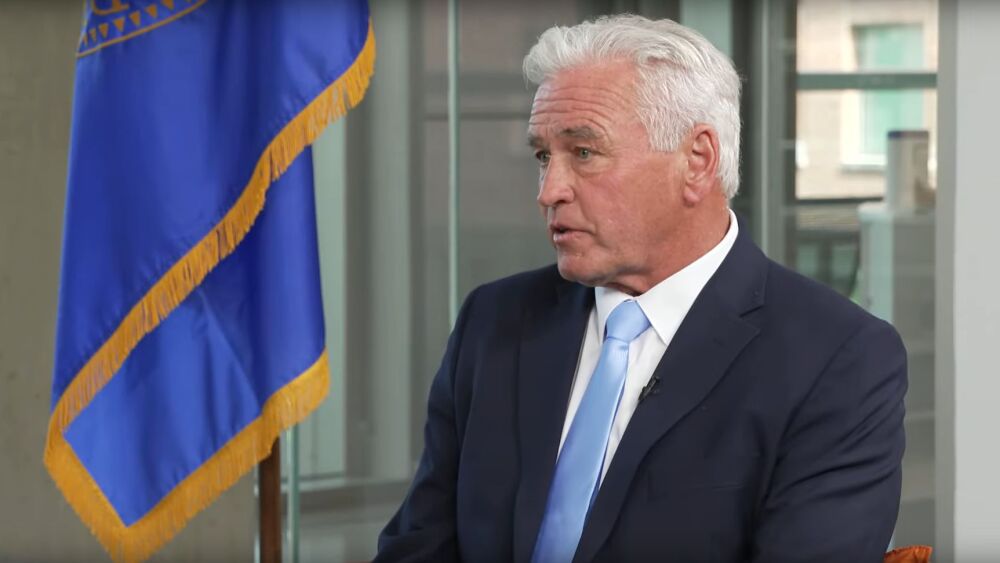Less than 24 hours after resigning his post as the FDA’s head drug regulator, George Tidmarsh is reportedly reconsidering his decision and vowing to fight for his name and credibility amid a probe into his “personal conduct” at the agency.
A day after tendering his resignation as the director of the FDA’s Center for Drug Evaluation and Research, George Tidmarsh is reportedly reconsidering that decision.
During a meeting of supervisors Monday at the FDA’s Office of New Drugs, OND Director Mary Thanh Hai conveyed remarks from Tidmarsh to senior staffers, saying that he is on administrative leave and is not resigning, according to a person familiar with the meeting, Endpoints News reported. Tidmarsh later told Endpoints that he was “second-guessing” his decision to resign. “I’m going to fight it. It’s my name and credibility,” he told the publication on Sunday of the ongoing investigation into his “personal conduct.”
Originally published 8:24 a.m.
FDA’s Tidmarsh Exits Amid ‘Personal Conduct’ Probe
George Tidmarsh, director of the FDA’s Center for Drug Evaluation and Research, resigned from his post Sunday amid an ongoing probe over his “personal conduct,” according to several media reports.
Tidmarsh was placed on administrative leave on Friday, a spokesperson for the Health Department told CNBC, after the agency was made aware of “serious concerns about his personal conduct.” Tidmarsh tendered his resignation Sunday morning, effective immediately.
Tidmarsh was appointed in July, bringing with him years of industry experience. He had held several executive spots at different companies, including Solano Therapeutics, La Jolla Pharmaceutical and Horizon Pharma.
The investigation that ultimately led to Tidmarsh’s resignation is connected to a complaint by Kevin Tang, who has gained a reputation in the industry because of his work snapping up and closing down struggling companies. Tang carries this out through his shell company Concentra Biosciences, which just this year has successfully bought at least three biotechs—iTeos, Cargo Therapeutics and Kronos Bio—and made a pass at a few more.
In late September, Tidmarsh attracted Tang’s ire after he singled out Aurinia Pharmaceuticals’ lupus nephritis drug Lupkynis, which the former regulator claimed was an example of the need to reevaluate the use of approvals based on surrogate endpoints. In a now-deleted LinkedIn post, Tidmarsh said that Lupkynis had “significant toxicity” and “has not been shown to provide a direct clinical benefit for patients.” Tang is the chair of Aurinia’s board of directors.
“For some diseases such as lupus nephritis companies have not run trials to demonstrate the benefit on hard clinical endpoints,” Tidmarsh wrote. The FDA signed off on Lupkynis in 2021 based on urinary protein-creatinine ratio, a biomarker indicative of kidney health. Aurinia subsequently filed data from an extension study, which led to a label update for Lupkynis, reflecting better long-term efficacy.
Following Tidmarsh’s post, Tang filed a complaint with the FDA, which the agency referred to the Office of Inspector General, according to reporting from STAT News. Aurinia filed a lawsuit on Sunday, accusing Tidmarsh of a “longstanding personal vendetta against Kevin Tang,” STAT reported.
“Secretary Kennedy expects the highest ethical standards from all individuals serving under his leadership and remains committed to full transparency,” a health department spokesperson told STAT in a statement on Sunday.
Tidmarsh’s tenure at the FDA was rocky. In an article on Sunday, The New York Times reported that Tidmarsh found the agency to be a toxic work environment—a situation that he attributed to Vinay Prasad, his counterpart at the Center for Biologics Evaluation and Research. Prasad himself was kicked out of the FDA in late July, before being reinstated 10 days later.
Speaking to STAT, Tidmarsh suggested that Prasad had a role to play in his ouster, though he did not provide additional details.
Tidmarsh’s resignation continues a string of high-profile exits at the Department of Health and Human Services. Most prominently, CDC Director Susan Monarez was given the boot after just 28 days on the job—a termination she alleges was driven by her refusal to pre-approve vaccine recommendations. Earlier this year, Prasad’s predecessor Peter Marks and Nicole Verdun, former director of the FDA’s Office of Therapeutic Products, also left the agency.








